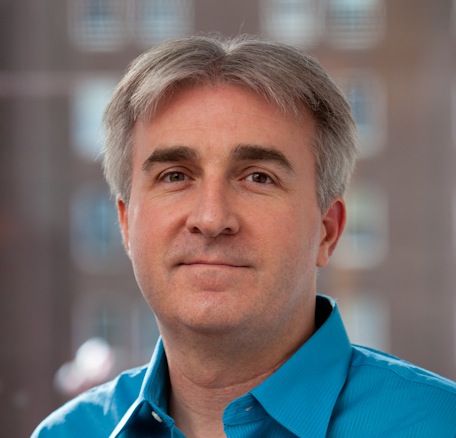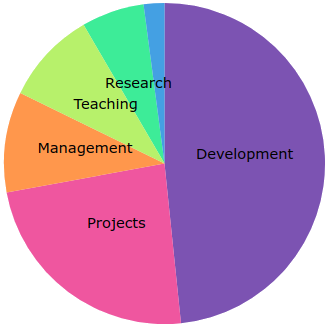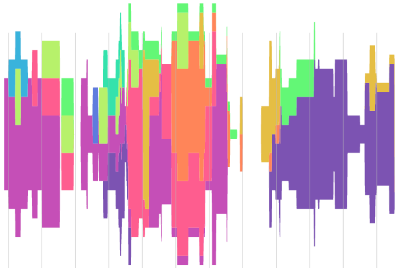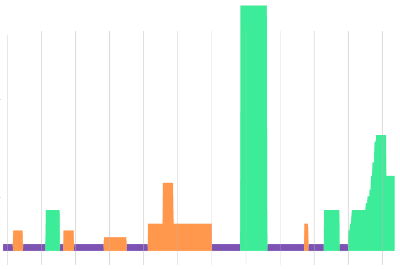Talks and Presentations
Professionally, I have given many presentations. The content is most often about software architectures, product road-maps or team updates. The majority of these talks have been to other engineering groups, but they also included a fair number of board and company-wide presentations.
Most of these talks contained proprietary information and slides decks I had to leave behind. There are few that I have been able to share and you can see them below.
Engineering Challenges in Legal Technology
San Marcos, TX, February 2019.
I was invited to give a technical seminar for the faculty and students in the Computer Science Department of Texas State University. The faculty were interested in exposing students to examples of technical problem solving in a business context. I was given permission by my employer (CS Disco) to discuss some of our work around distributed data storage architectures for our large data sets.
Acting Optimally in Partially Observable Stochastic Domains
Bellevue, WA, July 2013.
Leslie P. Kaelbling, Michael L. Littman and I authored a relatively influential paper that we presented in Seattle at the 1993 American Association of Artificial Intelligence (AAAI) conference. On the occasion of the conference returning to Seattle in 2013, we were honored to receive the retrospective "AAAI Classic Paper Award" for that work. I was chosen to speak about our work and the impact it has had over the years.
The History of Pronto.com
New Brunswick, NJ, January 2012.
I presented an overview of the history of a company I co-founded called "Pronto" at Connotate Technologies, Inc. in New Jersey. It was a retrospective on how a start-up evolves, the good decisions, the bad decisions and the lessons learned. The talk covers the early successes and growth, as well as the reasons for its ultimate demise.
Note that the slide deck was updated in February 2013 after the dissolution of Pronto to make the story complete.
POMDPs: Who needs them?
Austin, TX, November 2004.
The Department of Computer Science at the University of Texas invited me to give a talk about my research work on Partially Observable Markov Decision Processes (POMDPs). There were some research groups in the department that were fairly skeptical of the model, but when they learned that I was "local", they were interested in hearing what I had to say on the topic.
This talk was notable as being the first time I ever showed up to give a talk without a computer or materials. I put this talk on the web and sent the link in an email. It was pure HTML, no PowerPoint or other proprietary software requirements to worry about. The host just needed to fire up a browser on the machine already connected to the projector. This is in contrast to what used to always happen with cables, laptop swapping and projectors always failing in some way, then giving rise to the spectacle of 5 people with Computer Science Ph.D.s struggling to figure out what was happening.
Other Invited Talks (content not available)
CEDMOS - Complex Event Detection and Monitoring System
DARPA/Rome Laboratory Planning Initiative (ARPI) Workshop, Arlington, VA, October 1998.
The research lab I was working for at the time, Microelectronics and Computer Technology Corporation (MCC) had a DARPA contract which I was assigned to. I presented work at this conference on the problem of making sense of the chaos in the micro battlefield events by turning them into coherent macro events that were not readily recognizable.
The premise of going to Washington, D.C. and giving this talk was to impress some Generals with deep pockets and bring back more funding. Everyone at the conference had the same idea, but not a single General showed up.
An Algorithm for Dynamic Programming Updates in Partially Observable Markov Decision Processes
Sixth INFORMS Computer Science Technical Session Conference (CSTS), Monterey, CA, January 1998.
I was invited to present my research work on POMDPs at a conference which was notable for being a math conference and not a machine learning or AI conference. The POMDP work, a stochastic model, has applicability across many domains, but up until this point I had only ever made presentations to Computer Science audiences.
Discrete Bayesian Models for Mobile Robot Navigation
AAAI Spring Symposium, Stanford University, Palo Alto, CA, March 1996.
These seasonal AAAI symposiums present works in progress. On this occasion, I presented some of the interesting work I had done using the POMDP model for autonomous navigation in the robotics domain.
Learning Policies for Partially Observable Environments: Scaling up
Twelfth International Conference on Machine Learning, Tahoe City, California, July, 1995.
I was chosen to present the work Leslie P. Kaelbling, Michael L. Littman had and I had done in Machine Learning. The talk was scheduled in a plenary session, which means there is only one talk at that time, so that every conference attendee was present. Though it was a small conference, it still consisted of a couple hundred researchers, while my previous audiences never went above 10. It was nerve wracking, but a good experience nonetheless.
Learning Policies for Partially Observable Environments: Scaling Up
Action Workshop, Massachusetts Institute of Technology, Cambridge, MA, March 1995.
This was the first time we presented the preliminary work that would lead to the publishing of our ML'95 conference paper.



